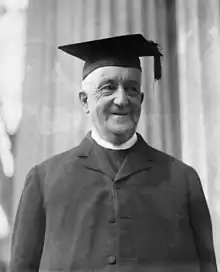
Samuel Hart (1845–1917) was an American Episcopal clergyman, classicist, and liturgical scholar.
Biography
Samuel Hart was born at Old Saybrook, Connecticut on June 4, 1845.[1][2] He graduated from Trinity College in 1866, after 1868 taught at that institution, and was made professor of Latin in 1883. He had been ordained priest in 1870, and in 1893 he was elected Bishop of Vermont, but declined the office. In 1886, he became custodian of the Standard Prayer-Book of his church, and in 1892 secretary of the House of Bishops. In 1899 he became vice dean and professor of doctrinal theology and the Prayer-Book, and in 1908 dean, at the Berkeley Divinity School, then in Middletown, Connecticut. He was elected president of the American Philological Association in 1891.[1]
He died in Middletown, Connecticut on February 25, 1917.[2][3]
Publications
He published editions of Juvenal (1873) and Persius (1875); edited Bishop Seabury's Communion Office (1874) and Historical Sermons of Bishop Seabury (1883–1886); and wrote on The Book of Common Prayer (1910) and Faith and the Faith (the Bohlen lectures, 1914).
References
- 1 2 Johnson, Rossiter; Brown, John Howard, eds. (1904). The Twentieth Century Biographical Dictionary of Notable Americans. Vol. V. Boston: American Biographical Society. Retrieved April 8, 2022 – via Internet Archive.
- 1 2 "Dr. Samuel Hart, Berkeley Divinity School Dean, Dead". Hartford Courant. February 25, 1917. pp. 1, 20. Retrieved April 8, 2022 – via Newspapers.com.
- ↑ "Tributes Paid To Rev. Dr. Samuel Hart". Hartford Courant. March 26, 1917. p. 8. Retrieved April 8, 2022 – via Newspapers.com.
Honor was paid to the memory of Rev. Dr. Samuel Hart, late dean of the Berkeley Divinity School, Middletown, in a memorial service at the Church of the Good Shepherd Yesterday afternoon, at which clergymen from various parts of the state were in attendance and for which the...
- This article incorporates text from a publication now in the public domain: Gilman, D. C.; Peck, H. T.; Colby, F. M., eds. (1905). New International Encyclopedia (1st ed.). New York: Dodd, Mead.
{{cite encyclopedia}}: Missing or empty|title=(help)
External links
- Works by or about Samuel Hart at Internet Archive
- Works by Samuel Hart at LibriVox (public domain audiobooks)
